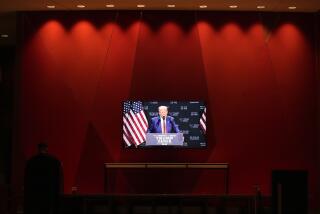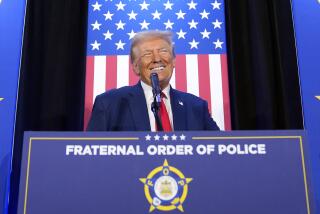Editorial: Trump has declared war on American cities
President Trump campaigned in 2016 against an imaginary nation of 1970s-era āinner citiesā beset by fear and violent crime. The narrative worked for him then, so heās doing it again ā but this time he has the power to make his dark vision real by sending federal agents dressed like military commandos into those same cities. Heās done it in Portland, Ore., and is now portraying the deployment of FBI agents to help fight crime in other cities as a similar assault by his forces of law and order against protesters, supposed antifa fifth columnists, and the most dastardly America-haters of all ā Democrats.
Trumpās message is that cities led by Democrats are crumbling into chaos, and that demonstrators decrying police brutality and seeking to ādefund the policeā have decimated local police forces and left innocent people at the mercy of criminals. The supposed threat to public safety is Trumpās pretext for deploying federal agents to cities that not only havenāt asked for them, but may even be suing to have them removed.
He describes his response as a āsurgeā of federal law enforcement, borrowing a term best known today to describe the large-scale injection of military force in Iraq by President George W. Bush and in Afghanistan by President Obama. The message is unmistakable: The federal government is fighting dangerous insurgents in U.S. cities to keep them from overrunning the nation.
The most worrisome thing about Operation Legend ā named for 4-year-old LeGend Taliferro, who was shot to death in June while sleeping in a Kansas City apartment ā is Trumpās willingness to use the power of his office for his own political benefit by using federal policy and personnel to promote his campaign for reelection.
Just as he pressed Ukraine to take action that could undermine the political standing of former Vice President Joe Biden ā now the presumptive Democratic nominee for president ā Trump is gearing the current surge largely for political optics. The goals here include discrediting the Democratic Party and consolidating support for Trump based on fear of crime.
Trumpās lies are strengthened, as lies so often are, by an element of truth.
Following an even steeper decline in crime during the second quarter of the year, brought on by the COVID-19 pandemic and closures that kept people indoors for weeks, June and July have seen an actual and frightening jump in violent offenses. Shootings and killings are up in Milwaukee, Philadelphia, New York, Chicago, Atlanta and some other cities. The problem is real.
So is the need for federal help, which could take the form of FBI investigators or crackdowns on illegal weapons by the Bureau of Alcohol, Tobacco, Firearms and Explosives.
But Trump is unlikely to pursue a gun crackdown, tied as he is to the National Rifle Assn. and other pro-gun groups.
When responding to mass shootings in El Paso, Texas, and Dayton, Ohio, one very long year ago, Trump said the fault lay with violent video games and mental illness. āMental illness and hatred pulls the trigger,ā Trump said at the time, ānot the gun.ā
Now he blames not mental illness but his political opposition. His wicked genius is to deploy federal agents to cities like Chicago, where they can provide real help, while presenting them as part of a phalanx of troops that are rescuing cities from supposedly violent anti-racism protesters in places like Portland. In this manner he can appeal to white voters feeling anxiety about the Black Lives Matter movement, but without appearing blatantly racist, while at the same time portraying himself as the true champion of embattled Black city dwellers.
And, of course, any city suffering under the heel of Democrats. Trump has said that might include Oakland, although violent crime is down there from last year, and Detroit, which also is not one of the cities suffering from a steep increase in shootings.
But both cities have large Black populations, both are thoroughly Democratic, and both have a lingering image ā especially in the minds of older voters ā of violent crime in decades past. They are the victims of Trumpās perverse nostalgia for āinner cityā meltdown, and his cluelessness about the meltdown of his own making in the form of poor pandemic preparedness and management, and retreat from police reform.
Does he have the ability to lead a domestic law enforcement surge? He certainly seems to think so. On the campaign trail four years ago, he declared himself smarter and better at military operations than U.S. generals. Perhaps thatās why generals such as H.R. McMaster, John Kelly and James Mattis all left his administration. They just werenāt up to his standards.
More to Read
A cure for the common opinion
Get thought-provoking perspectives with our weekly newsletter.
You may occasionally receive promotional content from the Los Angeles Times.










